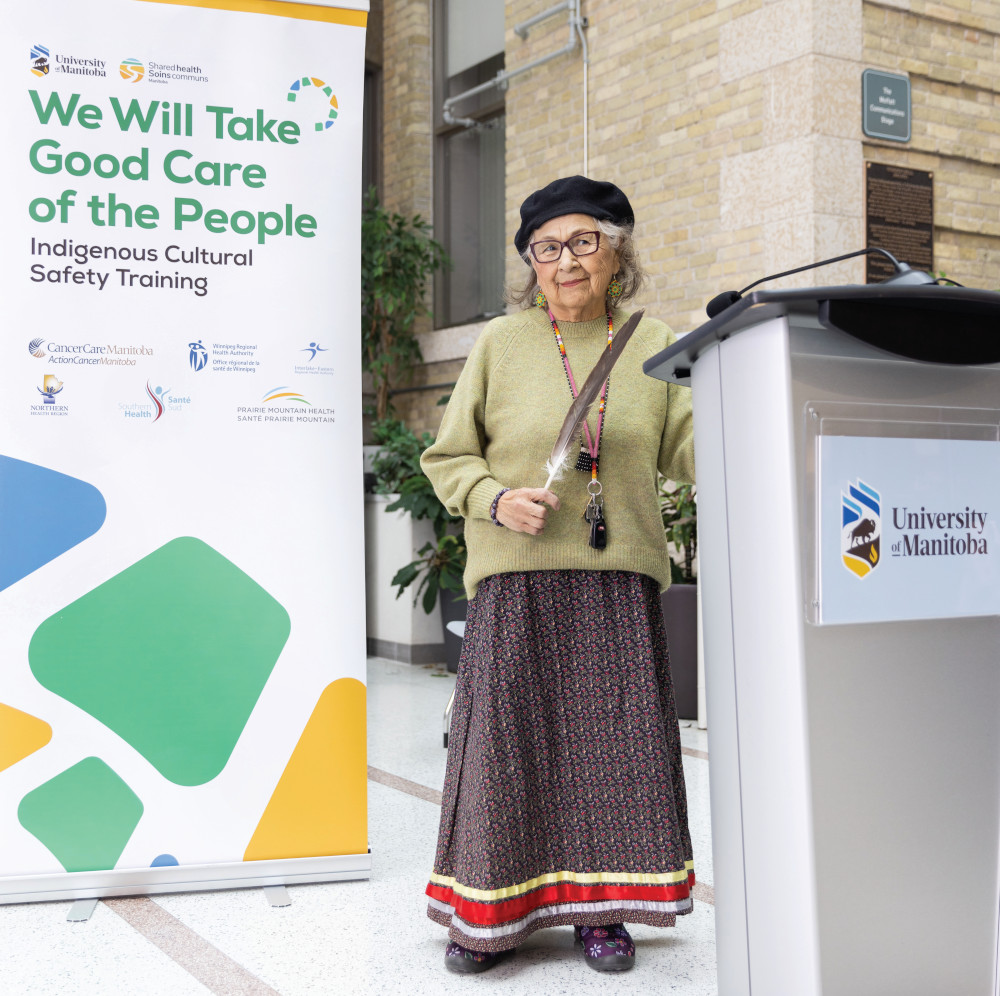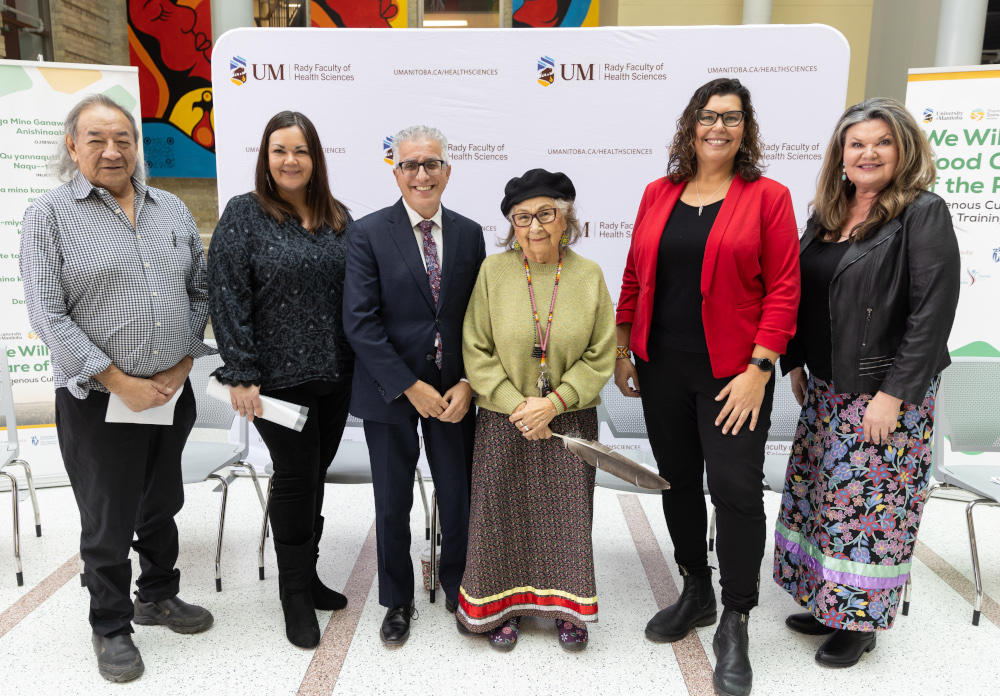
A training program designed to ensure that Manitoba health-care workers provide culturally safe care to Indigenous patients has been developed by Ongomiizwin, the Indigenous Institute of Health and Healing in the Rady Faculty of Health Sciences, in partnership with Manitoba’s health system organizations.
UM and Shared Health jointly launched the program at an event in November that included a pipe ceremony and a feast.
The training will be offered to health-care workers across the province, as well as to faculty members and learners in the Rady Faculty. There will be an initial capacity to train up to 3,000 people annually, with each health employer identifying teams to participate each year.
Kookum (Grandmother) Margaret Lavallee gave the program its name: Giga Mino Ganawenimaag Anishinaabeg, meaning We Will Take Good Care of the People in Anishinaabemowin. Local Indigenous Knowledge Keepers and health-care leaders contributed to the program’s content.
The training consists of 10 online asynchronous modules that take a total of about 10.5 hours to complete, followed by an in-person workshop of two to three hours to consolidate learning.
“The purpose of the training is to address racism, foster culturally safe environments for Indigenous patients, and improve Indigenous health,” said Marcia Anderson [MD/02], the Cree-Anishinaabe physician who is vice-dean Indigenous health, social justice and anti-racism of the Rady Faculty of Health Sciences.
“Indigenous people make up 18 per cent of the Manitoba population. They have the poorest health status and the lowest life expectancy of any group. As an important step toward closing the health gap between Indigenous and non-Indigenous people, we’re providing staff at every level with the foundational knowledge to provide more racially just and culturally safe care.”
It’s essential for anyone involved in health care in Manitoba to acknowledge the multi-generational harms caused to Indigenous people by the health and residential school systems, Anderson said.
The training is supported through a grant of nearly $1 million awarded to Ongomiizwin through Health Canada’s Addressing Racism and Discrimination in Canada’s Health Systems program. It is being implemented as a partnership between UM and Manitoba’s five health regions.
“All health-care workers have a responsibility to understand First Nation, Métis and Inuit Peoples’ rights to culturally safe, equitable, dignified health care,” said Charlene Lafreniere, Shared Health’s provincial lead, Indigenous health.
“Providing improved training across health organizations, including among decision-makers … is one strategy we are implementing to address inequities and create a health system that is better equipped to deliver culturally safe, anti-racist health care.”
The training for UM staff will be provided through UM Learn, the university’s learning management system (LMS). Health-organization staff will take the training through the Shared Health LMS. Private clinicians and external organizations can take the training through the Max Rady College of Medicine Continuing Professional Development LMS.
UM President and Vice-Chancellor Dr. Michael Benarroch thanked Ongomiizwin for its vision, determination and expertise in creating the program. “This is a tremendous day,” he said.
Melanie MacKinnon [BN/96], executive director of Ongomiizwin and leader of Ongomiizwin-Health Services, hosted the event and spoke.
“Participating in this new training is a meaningful step that physicians, learners, trainees and other health workers can take toward reconciliation and as part of their responsibility to redress harm,” she said.
Topics covered in We Will Take Good Care of the People include the impact of colonization on Indigenous health; strategies for recognizing and addressing racism in the health-care system; understanding the health-related Calls to Action made by the Truth and Reconciliation Commission; and how the location of Indigenous patients (urban, rural/remote or on-reserve) has implications for health-care delivery.
A team of Indigenous coach-facilitators will be available to participants as they proceed through the program. This team will also lead the in-person workshops. “These facilitators will be trained to support learners as they translate the content of the modules into meaningful action,” Anderson said.

Dennis White Bird, former Grand Chief of the Assembly of Manitoba Chiefs, spoke on behalf of the 63 First Nations in the province.
“This new training program is vital for all health-care professionals, whether they’re new to the field or have worked in health care for many years,” he said.
“My hope is that … First Nations people feel safe, respected and treated with compassion and empathy.”
Although cultural safety training has been provided to Manitoba health workers since 2015, this is the first such program to be created in Manitoba.
The launch of We Will Take Good Care of the People follows recent organizational pledges to take action to address Indigenous-specific racism. The Canadian Medical Association apologized in 2024 for its role, and the role of the medical profession, in past and ongoing harms to First Nations, Inuit and Métis Peoples in the health system.
The College of Physicians and Surgeons of Manitoba (CPSM) apologized in 2023 for ongoing Indigenous-specific racism in the medical profession. It recently passed a mandatory requirement for Indigenous-specific anti-racism training for all CPSM registrants. Completion of We Will Take Good Care of the People meets this requirement.
View the launch event: https://www.youtube.com/live/iDLlZoM4Sxw
BY ALISON MAYES
